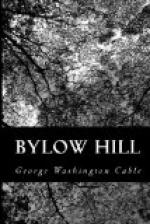Isabel was to go with him, and they were to sojourn at some point where she would still be within prompt reach of medical skill, yet from which he could make long jaunts into the absolute wilds.
Mrs. Morris was far from well when they left, and the day afterward she was seriously ill. That night Ruth sat up with her, and the next day she was worse, yet begged that no telegram be sent to her daughter.
At the close of the day there came a letter from Isabel. It said that Arthur, “already a new man,” would start the next morning at dawn for a three days’ trip into the wilderness. He went; and he had not been three hours gone when Isabel received a dispatch calling her to her mother. The only day train would leave in a few minutes, and she had the fortune to catch it.
Ruth met her at the station with the blessed word “better.” They went up from the town in Ruth’s carriage, Martin Kelly driving, who let it be known that though the doctor’s name, “moy graciouz!” were signed to the telegram seven times over, the actual painstaker and sender was “Linnard Boyington, whatsomiver!”
Still Ruth called it the doctor’s telegram, and said it made no difference who sent it; but she saw Isabel was disturbed. “Well, Martin, Doctor will have to wait on himself to-morrow; Leonard will be out of town.”
That evening, alone with her brother, she said, “But I thought you were to be out of town to-morrow.”
“No,” he replied, “I don’t think I’d better.”
Another day passed, another came, and Mrs. Morris was still in danger. Isabel wrote Arthur that she would be with him the moment the peril was over, if he needed her; but if he did not, she would stay on for her mother’s fuller recovery. Her letter had barely gone when she received a pencilled line brought in to the mountain hotel by a chance messenger and sent on to her, saying he would be out on his tramp five days instead of three. On the fifth day she telegraphed that her mother was getting well so fast that she would come, now, at his word.
The next morning she betrayed to Ruth a glad sense of relief as she showed her a dispatch from Arthur, which read: “Going on another trip to-morrow. Stay till I write.”
Ruth repeated it to her father and brother at their noonday meal. Leonard made no comment, but the General asked pleasantly—
“Is she certain he won’t come in on this evening’s express?” He was discerning more than any one wanted him to.
However, at dusk came the train, took water at the tank, stopped at the station, and passed on, and Arthur did not appear.
“Well, I’ll go to bed,” blithely spoke the General. “I’m not so old as I used to be, but I’m tired, after writing that letter this afternoon—to Godfrey. Good-night.” So he gave fair notice that he had moved in this matter, himself.
“I didn’t know father had received a letter from Godfrey,” said Ruth, shading her face from the lamp, and lifting to Leonard a smile which implied that it would have been but fair for him to have told her.




